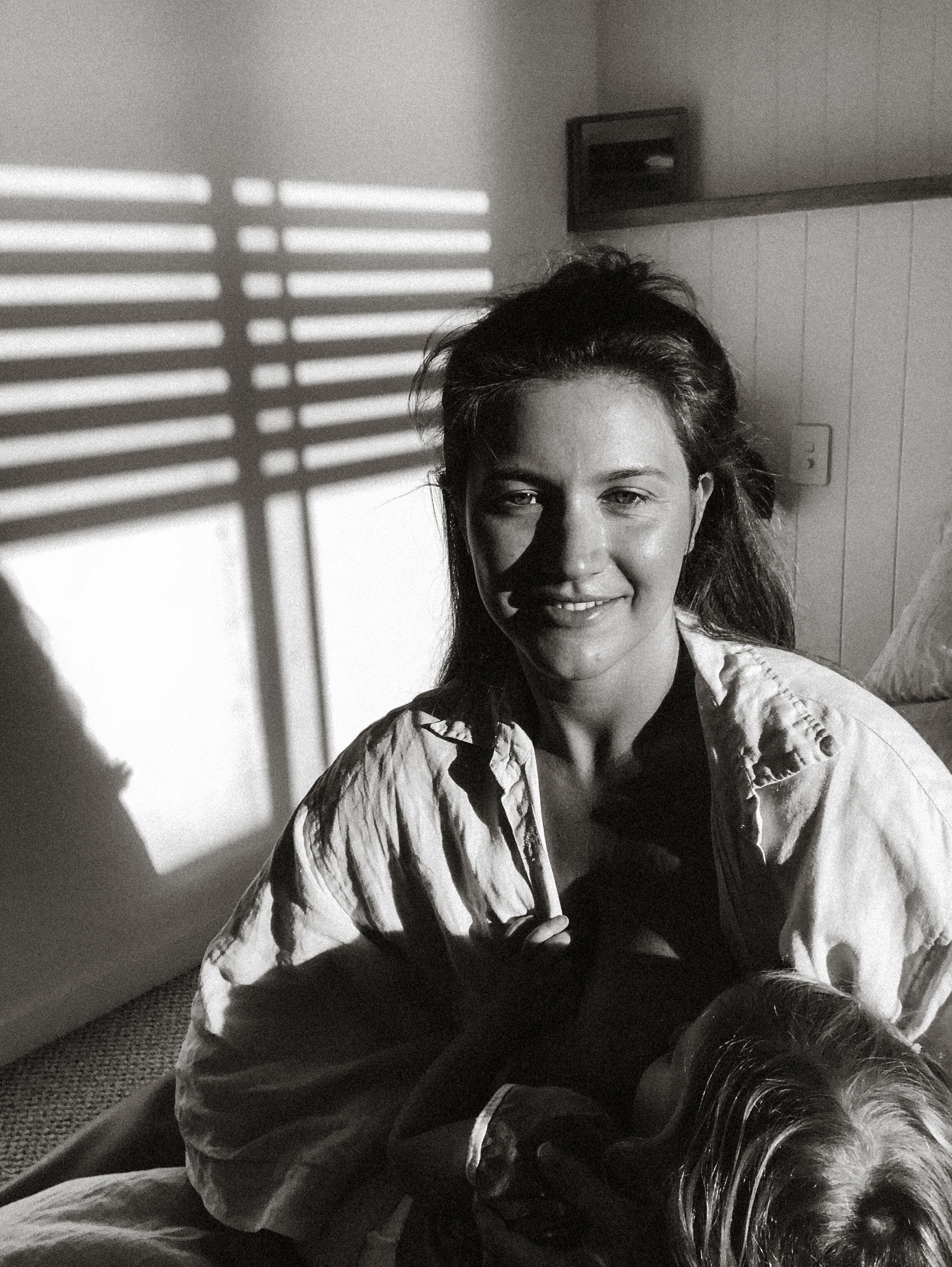Leila Armour of Village For Mama on Postpartum Nutrition, Australia
Photography by: Trina Cary Photography
Can you share a little about your background?
I have always been a creative; both of my parents are creative and entrepreneurs so I suppose they have been an influence on the path I have chosen to follow. I love food and the creative outlet that cooking gives me. When I finished school I completed a double degree in fine arts majoring in fashion and business majoring in advertising. When I graduated I ended up opening a little yellow Mexican cantina. I loved the creative side of fashion but the industry itself really didn’t align with my values or lifestyle.
Having a food business meant that I ended up spending long days working in a kitchen and I didn’t have the time to work on the other aspects of the business that I enjoyed too. I decided to sell and move onto something different, something that I hadn’t found yet. The day the shop sold I found out I was pregnant which steered my life in a whole new direction. I became a mother and not long after that, village for mama started to grow.
What inspired you to focus on postpartum nutrition?
Becoming a mother and my own journey and experience. I had the most wonderful birth and fourth trimester and it was largely due to my preparation and support network. I read a few books about the first 40 days, the golden month and the fourth trimester. I absolutely adored the idea of this time, sheltered away, enjoying warm, nourishing food and learning myself as a mother and my new baby.
In order for me to adopt these traditional practises, I really felt like my family and friends had to read some of the books too, to really understand what was involved in terms of nourishment and support. I was lucky enough that my mum agreed to read them too and in turn helped me apply some of the traditional wisdom and practices into my life a new mother.
Having nutrient dense nourishing meals delivered to me each day made everything possible. Not only was I well fed to support my recovery, mood, energy and milk supply. These delivers allowed me to forget any household obligations and focus my attention to resting, recovering and looking after my baby.
Living through this inspired the idea of village for mama and led me down a path of researching and then studying postpartum nutrition.
Why do you think diet is such an important aspect of recovery for both new and experienced mothers?
From the moment a woman falls pregnant, her body selflessly priorities the needs of her growing baby.
Not to mention the entire new organ, the placenta, her body grows to support and nourish new life. As a result, most new mothers are left depleted and exhausted just as they enter their postpartum period. If a mother is not meeting her daily nutrient requirements, which are higher for a breastfeeding mama, her body will continue to prioritise her baby and will mobilise her own stores to make sure her breastmilk is nutritionally complete. This is nearly two years of a woman’s life where her body is no longer her own, and prioritises the needs of another first and foremost.
A nourishing postpartum diet not only promotes healing after birth but can also provide the energy a new mama needs, help rebalance hormones and support her breastfeeding journey. This is just as if not more so important for second, third and more time mothers. Depletion from pregnancy and breast-feeding can still be relevant for mother’s who have had their children 10+ years ago and so for a lot of mothers, especially those who have had their babies close together, a nourishing diet is essential.
In addition to physical health, would you say that diet plays a role in a mother's emotional and mental well-being as well?
Absolutely. More than one out of three women who have given birth in the past year reported suffering from some degree of depressive symptoms. There are several nutritional deficiencies that can be linked to postpartum depression too: Omega 3s, both DHA and EPA, Vitamin D, Iron and vitamin B12. A well balanced nourishing diet will also help maintain blood sugar levels and balance hormones, both of which can heavily impact a mother’s emotional and mental well-being.
What do you think are the most important foods to add to your diet during postpartum?
In the early days following birth, warm, soft and easy to digest food is really important. It is was traditional cultures prioritised and for good reason. As a mother’s uterus shrinks back down to its original size, all of her organs are going through a massive shift and as a result her digestion is likely to be comprised. After the first week she can start to incorporate other foods but still with an emphasis on hydrating, nutrient dense and easy to digest food. Also, making sure meals are balanced with carbohydrates for energy and building milk supply. Protein for repairing and rebuilding muscle and tissue and healthy fats for nourishing breastmilk, balancing hormones and stabilising blood sugar. Keeping hydrated is also really important especially when breastfeeding.
Soups made with bone broth or vegetables broth. Bone broth is an amazing nutrient dense option andrich in collagen.
Cooked vegetables especially grounding root vegetables like squash and sweet potato.
Nut butters are amazing as they are high in monounsaturated fats which help tackle the hormonalfluctuations and fatigue associated with the postpartum period. They are also delicious and providelasting satiation.
Sardines are an amazing source of so many important nutrients such as calcium, DHA and vitamin D3.
Fermented foods are wonderful for supporting digestion and nourishing breastmilk. Miso is a beautifully fermented option for adding into cooked meals.
Village for mama Postpartum Pantry Essentials:
Nut Butter
Hemp Seeds
Chia Seeds
Tahini
Miso
Sardines
Quinoa
Coconut milk & cream
Oats
Wild rice
Village for mama Postpartum Fridge Favourites:
Bone Broth
Ghee
Eggs
Sauerkraut
Root Vegetables
Dark Leafy Greens
Cauliflower
Avocado
Bananas
Dates
Are there any spices or herbs that you recommend incorporating into your diet specifically during the postpartum period?
Along with warming foods traditional cultures places an emphasis on warming spices like ginger, turmeric and cinnamon.
Turmeric is wonderful for the early weeks as it is known as a uterotonic which gently stimulates the uterus helping it return to its pre pregnancy size. It is also has powerful anti-inflammatory properties.
Ginger is also wonderful in the early weeks as it can help improve digestion and is a lactogenic herb which supports milk supply.
Cinnamon is a beautiful and delicious warming spice which helps increase circulation, improves digestion and helps restore energy.
Another absolute favourite of mine is fennel. Fennel not only soothes digestion for mama, it also passes through the breastmilk and can help reduce colic in the baby. It can also offset any bloating or gas caused by leek or garlic for those mamas or babies who are sensitive.
Are there any foods that should be avoided during postpartum?
Ideally a new mama wants to avoid cold food and processed food. Cold smoothies, juices and water are also best avoided.
Do you recommend taking any supplements to support postpartum recovery?
Absolutely. I think a lot of new mothers stop taking their prenatal once they have their baby but it is really important to continue taking it for the entirety of their breastfeeding journey. There are a few other supplements I suggest mothers take depending on their diet, conditions and symptoms. It can be really beneficial to speak to a holistic nutrition consultant or naturopath in those early weeks to help make sure you are meeting all of your needs and not further depleting your stores. Studies have shown that over 95% of this women of childbearing age fail to meet their daily recommended intake of DHA which is essential for maternal and baby health including improved mental health. So absolutely sticking to a great quality pregnancy multi for at least 6 weeks following birth and longer if you are breastfeeding and potentially also a great DHA supplement too.
I love the Megafood baby and me 2 and Foraged for you mothers essentials for multi vitamins. Rosita Cod liver oil for omega 3 and DHA.













